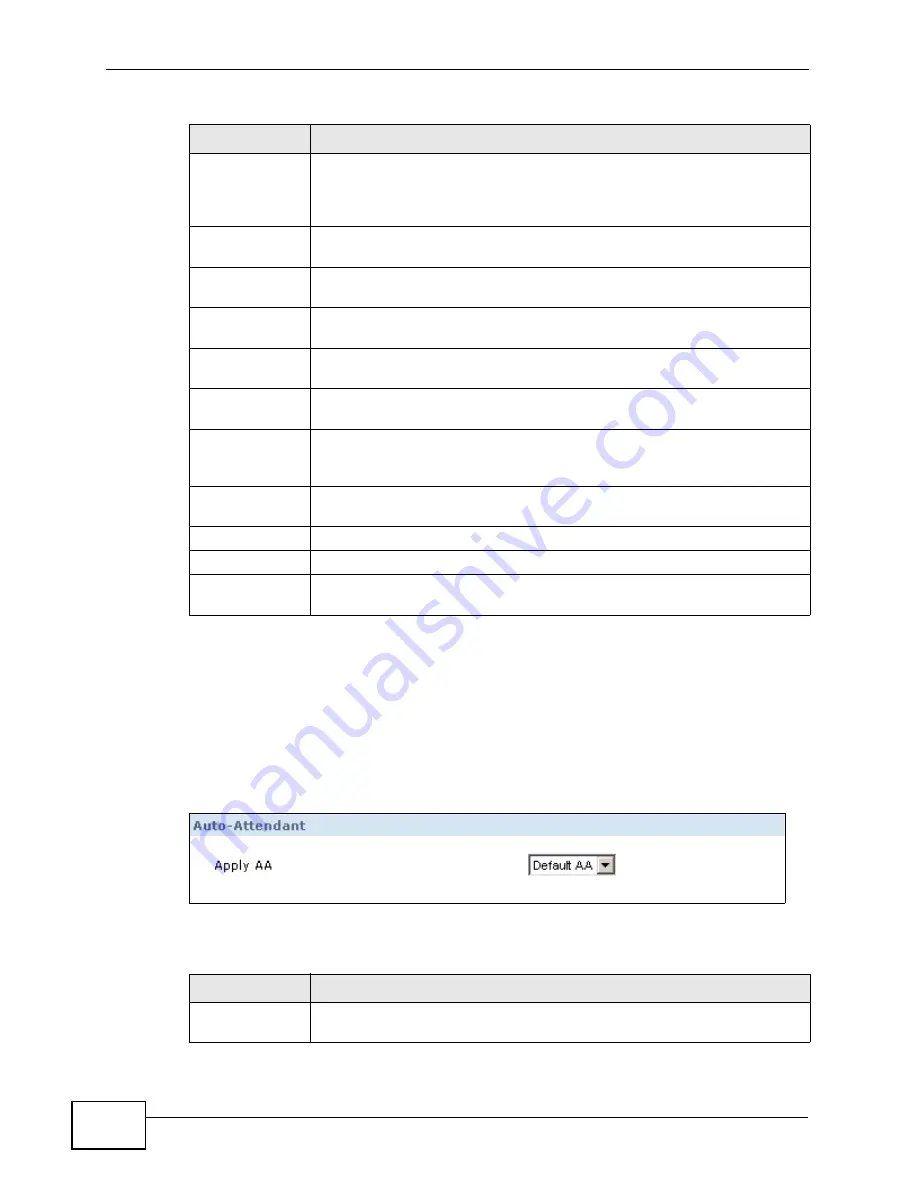
Chapter 18 Outbound Line Group
X2002 User’s Guide
266
18.3.2 Auto-Attendant for Incoming PRI Calls
Use this screen to select which auto-attendant should be used with this outbound
line group. See
for information on configuring auto-
attendant. Click the
Auto-Attendant
icon in the in the
PRI Trunk
section of the
Outbound Group
configuration screen to view the screen as shown.
Figure 149
AA for Incoming PRI Calls
Each field is described in the following table.
Type of Number Select the type for the prefix number which might be required by your
telephone company to make outgoing calls. The options you can select
are
UNKNOWN
,
INTERNATIONAL
,
NATIONAL
,
NETWORK
,
SUBSCRIBER
,
ABBREVIATED
.
Calling Party
Number Prefix
Enter a number to add in the beginning of the outgoing caller’s numbers
using this trunk line. This field can be 0-20 digits in length.
Calling Party
Number
Use this section to set your outgoing calling party numbers.
Directory
Number
Select this to have the PRI trunk use the number defined in the
Directory Number
field.
User Defined
Select this to have the PRI trunk use another number. Enter the number
in the field. This field can be 3-20 digits in length.
Hide Calling
Party Number
Select this to not have your calling party number display on the callee’s
caller ID.
Incoming
Calling Party
Number
For a PRI trunk set to use an ISDN signal, use this section to configure
your incoming calling party numbers.
Type of Number This indicates the type of incoming call to which you can associate a
dialing prefix.
Prefix
Assign a custom prefix to appended to this type of incoming call.
Apply
Click this to save your changes.
Cancel
Click this to go to the
Outbound Line Group
screen without saving
your changes.
Table 90
Configure a PRI Trunk (continued)
LABEL
DESCRIPTION
Table 91
AA for Incoming PRI Calls
LABEL
DESCRIPTION
Apply AA
Select an Auto-Attendant or ACD skill profile used for the calls incoming
through this PRI trunk.
Summary of Contents for X2002
Page 2: ......
Page 24: ...Table of Contents X2002 User s Guide 24...
Page 25: ...25 PART I User s Guide...
Page 26: ...26...
Page 40: ...Chapter 2 How It Works X2002 User s Guide 40...
Page 99: ...99 PART II Technical Reference...
Page 100: ...100...
Page 124: ...Chapter 5 Network Deployment X2002 User s Guide 124...
Page 166: ...Chapter 7 Auto Provision X2002 User s Guide 166...
Page 170: ...Chapter 8 QoS X2002 User s Guide 170...
Page 248: ...Chapter 16 Click To Talk Group X2002 User s Guide 248...
Page 252: ...Chapter 17 Group Access Code X2002 User s Guide 252...
Page 304: ...Chapter 19 Auto Attendant X2002 User s Guide 304...
Page 312: ...Chapter 20 LCR X2002 User s Guide 312...
Page 346: ...Chapter 22 Call Services X2002 User s Guide 346...
Page 380: ...Chapter 25 Status Observation X2002 User s Guide 380...
Page 402: ...Chapter 27 Call Detail Record CDR X2002 User s Guide 402...
Page 410: ...Chapter 28 ACD Logs X2002 User s Guide 410...
Page 416: ...Chapter 29 Administrator Accounts X2002 User s Guide 416...
Page 424: ...Chapter 30 Diagnostics X2002 User s Guide 424...
Page 426: ...Chapter 31 X2002 User s Guide 426...
Page 446: ...Chapter 32 Remote Management X2002 User s Guide 446...
Page 448: ...Chapter 33 TFTP Management X2002 User s Guide 448...
Page 462: ...Chapter 35 License Control X2002 User s Guide 462...
Page 482: ...Chapter 36 Web Portal X2002 User s Guide 482...
Page 508: ...Chapter 39 Product Specifications X2002 User s Guide 508...
Page 548: ...Appendix C Legal Information X2002 User s Guide 548...
Page 562: ...Index X2002 User s Guide 562...






























